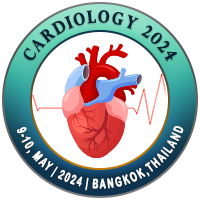
Ashiqur Rahman
Combined Military Hospital, BangladeshTitle: Assessing the Quality of Life of Patients With Percutaneous Coronary Intervention Versus Coronary Artery Bypass Graft
Abstract
At present, coronary heart disease is one of the most leading cause of premature death. To treat Coronary Artery Disease (CAD), percutaneous coronary intervention (PCI) and coronary artery bypass grafting (CABG) are fundamental revascularization procedures. Though there is no definite indication of which course, PCI or CABG, would be better treatment choice. Timely management with PCI or CABG can reduce mortality and improve the quality of life (QoL). The objective of this study was to assess the QoL of the patients who received PCI or CABG for treating their coronary heart disease. A retrospective observational study was performed among purposively selected PCI and CABG patients. These patients underwent PCI or CABG procedures at least three months before or more at enrollment. The total participating patients were 156, 78 in each group. After PCI or CABG procedures, health-related QoL was measured by using the SF-36 scale. The mean ± SD scores of QoL of PCI and CABG patients were 78.95 ±10.14 and 78.17 ± 10.92, respectively. Among them, 72.43% felt better after treatment, whereas 17.95% felt the same as before treatment and 9.62% felt worse than previously, in both groups. Comparing the two groups, CABG patients (38.46%) felt significantly better after receiving treatment compared to PCI (33.97%) (p=0.048). The mean ages were 58.10 and 60.88 years respectively. Males were significantly more in the CABG (89.74%) compared to PCI group (75.64%). In contrast, female patients had more PCI (24.36%) compared to CABG patients (10.26%) (p=0.020). Principal treatment (PCI/CABG) had a statistically significant association with sex (χ2=5.419, p=0.020), religion (p=0.028), health state, and post-treatment duration (p=0.026). Subjective perceptions of physical and psychological well-being improved significantly from before treatment to at least 3 months after treatment and a marginally better QoL was noticed for medical intervention (PCI) than the surgical approach (CABG).
Biography
Ashiqur Rahman has completed his MPH in Epidemiology from National Institute of Preventive and Social Medicine (NIPSOM), Bangladesh, Diploma in Tropical Medicine and Hygiene (DTM&H) from Thailand. He also acquired certificate courses from Mahidol University (Thailand) on Clinical research, Medical Biostatistics, Statistics for research, Certificate Writing Sciences. He has been working in public health for 15 years, as epidemiologist and hospital administrator in Bangladesh. He has over 10 publications in several reputed journals.

